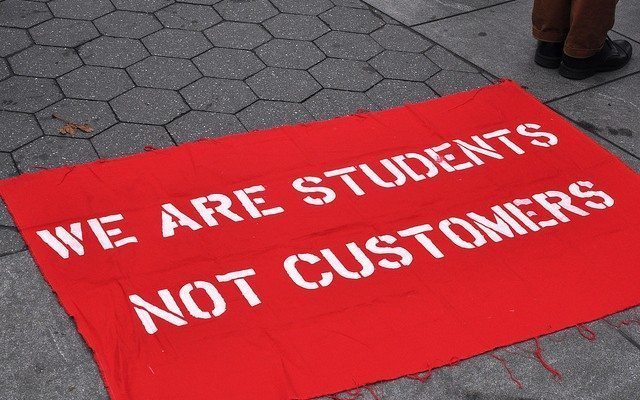
Education
Are Law Schools to Blame for Graduates’ Struggles?
I spent much of this past holiday season mulling over a sob story about a JD who got screwed by the law school racket. Though the media landscape of the past several years is strewn with such wreckage, this particular tale of woe stood out for me. For one thing, the victim went to an unspecified top-20-ranked law school and yet is still struggling on a $45,000-a-year salary, living with his parents and staring almost $200,000 of debt in the face. For another thing, he met with this fate after spending two years working at “miserable small law firms” for one abusive, larcenous boss and for another who made him work for nothing for 3 months, for a paltry $1,000/month for the next 3 months, and for a measly $2,000/month for another 3 months after that.
Though this poor man ended the article on a self-blaming note — “At the end of the day, it’s my own fault for being a sucker” — the gist of the piece is that his dire straits are really his law school’s fault. The school fed him a slew of misleading, half-true statistics about his post-graduation employment prospects, never informed him about the demoralizing nature of much legal practice work or the non-transferability of legal skills in the job market, etc. The tireless law school detractor Elie Mystal at Above the Law agrees: “If we’re going to blame the guy for something, blame him for believing the hucksters who were selling him on legal education. It’s fine if you want to look down on the fool who buys the snake-oil thinking that it will cure cancer, just don’t forget that the real culprit here is the snake-oil salesman.”
As an underemployed 28-year-old who also wonders whether law school was the right choice for him, I sympathize with my compatriot’s quandary. Yet I must confess that I’ve never felt that kind of resentment toward my law school, and never felt as if anyone were to blame but myself for the challenges I’ve faced in the job market. More broadly speaking, I’ve never joined wholeheartedly in the chorus of condemnation being directed at the legal academy.
Admittedly, it may be because I haven’t yet suffered quite the same misfortune as the subject of the article. My status as an international student (I hail from Montreal, Canada) slammed the federal student loan door shut in my face when I applied. While this had the obviously detrimental effect of saddling me (oh, hell, who am I kidding — on my mother, really) with a vastly heavier up-front tuition burden, it also required me to rely on my school for its modest financial aid grants and loans. As a result, I’m facing maybe a third of the student loan debt that the average law school graduate has to shoulder.
Also, my extracurricular activities and my post-2L summer internship plugged me into a network of public-interest and public policy organizations and foundations inside the Washington, D.C. Beltway. Those connections have so far netted me two back-to-back legal internships with nonprofits in the nation’s capital that have kept me employed since I graduated last May. I obtained the first position through an internship-stipend program that paid me $10 an hour during the summer — $1,600 a month. Last fall, I did a stint at a prominent D.C. think tank that was able to pay me a stipend of $1,400 a month. Each sum was too stingy to enable me to do much more than scrape by, especially after taxes…but scrape by I’ve so far managed to do, and without having to work for any bosses from hell, either. In those respects, I’ve been luckier so far than the hapless JD from the Business Insider article.
Yet I have a broader reason for steering clear of the “damn law schools” bandwagon. It is the applicants’ responsibility to conduct thorough research into the academic programs to which they apply and the careers to which they grant access, the better to ensure that they’re investing their time, tuition/loan money and work in the right places. More specifically, I think applicants have always borne that responsibility, since even before it became fashionable for pundits to pillory law schools for their purported racketeering.
Consider, for instance, this Business Insider interviewee’s own story. He rightly advises prospective law school applicants to “work for a law firm for at least a year before going to law school and see if it’s something you want to do.” (Sound familiar? I sure hope so.) Yet he seems to have learned this lesson the hard way, since at the interview’s outset, he answered the question, “Why did you decide to go to law school?” with “Because I wanted to be a lawyer. I also wanted greater career opportunities than my BA offered me.” Left unmentioned is the issue of what made him want to be a lawyer, or why he thought that a JD might be a ticket to any careers beyond just practicing law. It’s a pity the interviewer didn’t ask about it, for the answer might have shed some light on whether he had any business going to law school in the first place, regardless of the current state of the legal job market.
He further mentions, “I believed the legal education industry’s sales pitch circa 2007-08 that lawyers will always be in demand and that bankruptcy will be a hot practice area when the economy is poor.” Insofar as this pitch was misinformed or even downright dishonest, I sympathize — but only so much. These claims were certainly plausible and believable, especially from the vantage point of that period, when the economic crisis was just taking off and the arguable folly of law school wasn’t yet obvious. Nonetheless, these were law school officials leading our man astray — not actual lawyers. While he can be forgiven for listening to this advice, given its supposedly reputable source, it’s fair to blame him for falling for it hook, line and sinker. He shouldn’t have believed the hype without consulting some practicing lawyers who could have set him straight. They would have been much less biased sources of advice; after all, as he himself puts it, “law grads do not have an economic interest in your attendance at law school. The law school always does.”
Could he have been expected to know any of this back in his younger, more callow days? I think so. Anytime a school that mires its students in debt to the tune of hundreds of thousands of dollars paints a glowing portrait of its program, without mentioning any caveats or sounding any cautionary tone, one should always take its cheerleading with a grain of salt. Is his naiveté nonetheless understandable? Certainly it is…but there is a more general principle here, one that applies to the analysis of whether one should apply to any academic program. The people running these programs have a vested interest in getting you in their doors; what they tell you isn’t necessarily to be trusted. You should never base your decision entirely on their word.
None of what I’ve said here should be taken to mean that law schools themselves don’t deserve a hefty share of the blame for so many of their graduates’ predicaments. It’s only right to criticize them for their lack of transparency, which can and does have destructive consequences. Yet that doesn’t absolve applicants of their own responsibility to do their homework before jumping in with both feet. That principle holds truer than ever these days, with law school enrollment plummeting and law school-bashing so popular. I salute all those who continue to warn young people of the perils of going to law school unprepared, or for the wrong reasons, or at all; they are performing a valuable service to the public. I just hope that the intended beneficiaries of these warnings continue to be smart enough to listen up — before it’s too late.
Featured image courtesy of [Michael Fleshman via Flickr]







